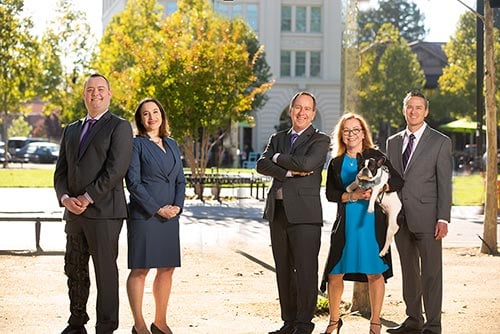Why You Should Welcome Being Uncomfortable By Nicole Jaffee and Rebecca Slay
Late winter and early spring provide us with multiple reminders of the importance of diversity and inclusion, including celebrating Martin Luther King, Jr. Day, Lunar New Year, Black History Month and Womxn’s History Month . And there is much to celebrate. However, while our country and Sonoma County have made great strides towards equality and equity, we need to continue to fight because we are far from free. By “we,” we do mean all of us. Diversity and inclusion is not a fight to be undertaken by members of underrepresented groups alone. We need allies. To be a powerful ally, one must engage in self-reflection and education. We are all biased, will make mistakes and be uncomfortable at times. It is precisely that feeling of discomfort that will help us make a real and lasting change toward an anti-racist society.
As members of the legal community, we understand the importance of word choice and precision in terminology. As such, when a word makes us uncomfortable, we should not avoid that feeling. Rather, we should hone in on the word and try to determine what precisely makes us feel off kilter. “Privilege” may be one such word.
What is “privilege”? “Privilege” does not mean that your life has been without challenges, difficulties, heartbreaks or betrayals. It is not synonymous with “racist.” It does mean that the color of your skin, the land of your ancestors, which language was spoken in your home growing up, your physical presentation, and/or how you are in the world neither increased the challenges, difficulties, heartbreaks and betrayals you faced nor acted as their proximate cause. Most of us live our lives swimming in a somnambulant sea of whiteness, of ableness, of cisgender heterosexuality, of secular Christianity, of food and housing security. How can we open our eyes to our role in it? By examining our privilege.
As race is a social construct, our caste system is based on appearances. “As we go about our daily lives, caste is the wordless usher in a darkened theater, flashlight cast down in the aisle, guiding us to our assigned seats for a performance. The hierarchy of caste is not about feelings or morality. It is about power — which groups have it and which do not.” In America, the privileged caste, the caste with power, is generally made up of those descended from the largely Anglo-Saxon Europeans whose fabulous economic coup d’état in the late 18th century created a new nation with property owning males at the top. If you did not look like one of those guys for any one of a million reasons, the “benefits of liberty” were not for you or your “posterity.” You, and your posterity, were forever destined to live outside the privileged caste. “White men are . . . far less likely to have to code-switch – adjust their style of speech, appearance, and behavior to fit into a particular culture and increase their chances of being hired, accepted, or promoted.” That is privilege.
Why is examining privilege important? It can reveal one’s biases. Those with privilege do not necessarily know what it is like to not be a member of the privileged caste and that even seemingly small actions and statements can have a profound and lasting effect on others. Code switching, or changing your vocabulary, dialect or presentation in order to be accepted by the dominant group is a daily, if not hourly, occurrence for those who are outside the privileged caste. For some whose personal identity does not conform to expectations established by northern European norms, code switching may be necessary to get home alive at the end of the day. And sometimes, even that isn’t enough.
One colleague told the authors, “Years ago, I was told after an interview by one interviewer that she had been asked by another attorney who was white about my ‘wild hair’ when they were considering hiring me. She told me she told him, ‘well you know she’s Black.’” After being hired, while conversing with our colleague, that same attorney started to say, “it’s like the pot calling the kettle…” looked at our colleague and stopped talking. Our colleague told us, “My race clearly made him uncomfortable and if the decision to hire me was his alone, I might not have been hired.” These two interactions affected our colleague in important ways. She wore her hair natural and let her thick curls show and hearing that her boss questioned her hair styling choice made her wonder whether she should pin her hair back after she was hired. When her boss chose another associate for a case or to join him at an event, she questioned whether his decision was because of her race. Our colleague eventually left that position for a more inclusive and welcoming law firm. The failure to recognize privilege and bias cost the law firm an attorney.
The next step after examining one’s privilege is to push to topple the legal barriers to full inclusion that have continued after centuries of opposition. Laws continue to be put into place to try to help people overcome bias. For example, the California State Bar is required to adopt regulations requirement the mandatory continuing legal education curriculum to include training on implicit bias and the promotion of bias-reduced strategies by January 1, 2022. By the end of 2021, publicly held domestic or foreign corporations whose principal executive offices are located in California are required to have at least one “director from an underrepresented community” on its board. By the end of 2022, that number may increase depending on the number of directors on its board. “Director of an underrepresented community” is defined as “an individual who self-identifies as Black, African American, Hispanic, Latino, Asian, Pacific Islander, Native American, Native Hawaiian, or Alaska Native, or who self-identifies as gay, lesbian, bisexual, or transgender.” This is in addition to the requirement that such corporations have at least one female director on their board and that by the end of 2021, that number may increase depending on the number of board members. A female is defined as “an individual who self-identifies her gender as a woman, without regard to the individual’s designated sex at birth.” While these are two separate laws, a director who identifies and female and a member of an underrepresented community can satisfy both requirements. Corporations that violate these laws are subject to fines and the California Secretary of State is required to publish annual reports by March 1 of each year related to these laws. Laws like these are a step in the right direction, but we all need to continue to push for more protections against bias on all levels.
While we were busy entrenching power and privilege for descendants of Europeans, those outside the privileged caste have created dynamic, healthy, thriving, prosperous, creative, valuable, positive, honorable and exceptional communities full of beautiful, motivated, intelligent, determined, resilient, strong, robust, effective and tenacious attorneys who would be an asset to any firm. Isolating ourselves in our privilege ultimately denies descendants of Europeans inclusion into our diverse, beautiful, multi-abled, multi-ethnic and multi-gendered nation. Justin Michael Williams, teacher, activist and artist, postures that we can end racism in one generation if 25% of the population promises to end racism. We ask that you, friendly reader, to join us in that pledge.
Point of pride and inspiration: Local non-profit the National Women’s History Alliance is responsible for the creation of National Women’s History Month; President Jimmy Carter adopted the first resolution as sponsored by Congresswoman Lynn Woolsey in 1979. Wilkerson, I. (2020) Caste: The Origins of Our Discontents. T. Melaku, et al, Be a Better Ally, Harvard Business Review, November-December 2020, https://hbr.org/2020/11/be-a-better-ally. For a fascinated discussion on the link between bias and productivity, please check out the profound presentation by Traci Owens, At the Risk of Being Uncomfortable: Unconscious Bias and the BIPOC Experience, that the Sonoma County Bar Association hosted on February 11, 2021. Bus. & Prof. Code §6070.5(a) (eff. 1/1/20). Cal. Corp. Code §301.4(a) (eff. 1/1/21). Cal. Corp. Code §301.4(b) Cal. Corp. Code §301.4(e)(1) Cal. Corp. Code §301.3 Cal. Corp. Code §301.3(f)(1) Cal. Corp. Code §§301.3(d)(e), 301.4(c). Reports pertaining to Women on Board started in March 2020; Underrepresented Communities on Boards will start March 2022. https://www.justinmichaelwilliams.com/blog/endingracism

